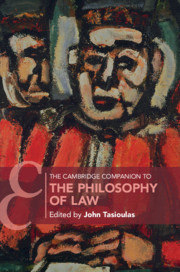Book contents
- The Cambridge Companion to the Philosophy of Law
- Cambridge Companions to Law
- The Cambridge Companion to the Philosophy of Law
- Copyright page
- Dedication
- Contents
- Contributors
- Introduction
- Part I General Theory
- Part II Values
- 6 The Rule of Law
- 7 Justice without Ethics: A Twentieth-Century Innovation?
- 8 Rights and Human Rights
- 9 Equality and Discrimination
- 10 Authority and Legitimacy
- 11 The Ends and Limits of Law
- Part III Special Theory
- Index
11 - The Ends and Limits of Law
from Part II - Values
Published online by Cambridge University Press: 15 June 2020
- The Cambridge Companion to the Philosophy of Law
- Cambridge Companions to Law
- The Cambridge Companion to the Philosophy of Law
- Copyright page
- Dedication
- Contents
- Contributors
- Introduction
- Part I General Theory
- Part II Values
- 6 The Rule of Law
- 7 Justice without Ethics: A Twentieth-Century Innovation?
- 8 Rights and Human Rights
- 9 Equality and Discrimination
- 10 Authority and Legitimacy
- 11 The Ends and Limits of Law
- Part III Special Theory
- Index
Summary
Historically the end of law has often been taken to be something like this: to secure the realisation of moral goals or to promote the well-being of persons. The law is (or should be) based on what a well-known opponent of such a view, John Rawls, would describe as a ‘comprehensive moral doctrine’. As Rawls puts it, a comprehensive moral conception ‘includes conceptions of what is of value in human life, and ideals of personal character, as well as ideals of friendship and of familial and associational relationships, and much else that is to inform our conduct and in the limit to our life as a whole’.1 He has in mind many ethical and philosophical doctrines that prescribe how one ought to act and live.
- Type
- Chapter
- Information
- The Cambridge Companion to the Philosophy of Law , pp. 208 - 234Publisher: Cambridge University PressPrint publication year: 2020

